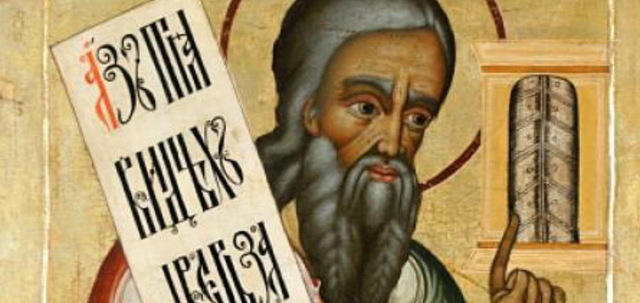Lesson: Ezekiel 33:7-11
Reading
7 You, mortal, I have made a sentinel for the house of Israel; whenever you hear a word from my mouth, you shall give them warning from me. 8 If I say to the wicked, “O wicked ones, you shall surely die,” and you do not speak to warn the wicked to turn from their ways, the wicked shall die in their iniquity, but their blood I will require at your hand. 9 But if you warn the wicked to turn from their ways, and they do not turn from their ways, the wicked shall die in their iniquity, but you will have saved your life.
10 Now you, mortal, say to the house of Israel, Thus you have said: “Our transgressions and our sins weigh upon us, and we waste away because of them; how then can we live?” 11 Say to them, As I live, says the LORD GOD, I have no pleasure in the death of the wicked, but that the wicked turn from their ways and live; turn back, turn back from your evil ways; for why will you die, O house of Israel?
Commentary
Ezekiel is one of the three “Major” Prophets – so called because of the length of the books of Isaiah, Jeremiah, and Ezekiel. Ezekiel was a priest who was among the first group of persons deported by the Babylonians when they captured Jerusalem in 597 BCE.
The Book of Ezekiel is in three parts: (1) Chapters 1 to 24 are prophesies of doom against Jerusalem before the destruction of the Temple in 586 BCE; (2) Chapters 25 to 32 are prophesies against foreign nations; and (3) Chapters 33 to 48 are prophesies of hope for the Judeans written during the Babylonian Exile (586-539 BCE).
Like other prophets, Ezekiel “prophesied” by speaking for God. Prophesy in the Hebrew Bible was not about telling the future. A prophet was one who speaks for YHWH.
Here, YHWH referred to Ezekiel as Israel’s “sentinel” to warn the people to turn from their wicked ways (v.8). The emphasis in the Book of Ezekiel was on personal responsibility (“their blood I will require at your hand” v.9), rather than seeing the acts of prior generations as the cause of the current situation. This was a new development in the Theology of Ancient Israel. Ezekiel also presented repentance (turning around) as the way to a restored life.
The Hebrew words (ben-adam) translated as “mortal” in verses.7 and 10 are sometimes translated in other contexts as “son of man.”
Epistle: Romans 13:8-14
Reading
8 Owe no one anything, except to love one another; for the one who loves another has fulfilled the law. 9 The commandments, “You shall not commit adultery; You shall not murder; You shall not steal; You shall not covet”; and any other commandment, are summed up in this word, “Love your neighbor as yourself.” 10 Love does no wrong to a neighbor; therefore, love is the fulfilling of the law.
11 Besides this, you know what time it is, how it is now the moment for you to wake from sleep. For salvation is nearer to us now than when we became believers; 12 the night is far gone, the day is near. Let us then lay aside the works of darkness and put on the armor of light; 13 let us live honorably as in the day, not in reveling and drunkenness, not in debauchery and licentiousness, not in quarreling and jealousy. 14 Instead, put on the Lord Jesus Christ, and make no provision for the flesh, to gratify its desires.
Commentary
Paul’s letter to the Romans was his longest, last and most complex letter. It was written in the late 50s or early 60s (CE) – about ten years before the first Gospel (Mark) was written – to a Jesus Follower community that Paul did not establish. Among other messages in the letter, Paul sought to encourage respectful and supportive relationships between the Gentile Jesus Followers and the Jewish Jesus Followers in Rome.
Paul was a Jew who became a Jesus Follower who saw the Jesus Follower Movement as part of a broader Judaism. As such, he continued to have expectations about the fullness of the Coming of the Messiah/the Christ.
Reflecting his Jewish roots, Paul exhorted the Jesus Follower Community in Rome to follow the Commandments, particularly to love one another as neighbors. Like most early Jesus Followers, Paul believed that Christ would return soon (“salvation is nearer to us now” v.11). Paul used “the flesh” (v.14) as his code word for the values of the world – values that are not consistent with living a life modeled on the life of the Jesus the Christ.
Gospel: Matthew 18:15-20
Jesus said, “If another member of the church sins against you, go and point out the fault when the two of you are alone. If the member listens to you, you have regained that one. But if you are not listened to, take one or two others along with you, so that every word may be confirmed by the evidence of two or three witnesses. If the member refuses to listen to them, tell it to the church; and if the offender refuses to listen even to the church, let such a one be to you as a Gentile and a tax collector. Truly I tell you, whatever you bind on earth will be bound in heaven, and whatever you loose on earth will be loosed in heaven. Again, truly I tell you, if two of you agree on earth about anything you ask, it will be done for you by my Father in heaven. For where two or three are gathered in my name, I am there among them.”

